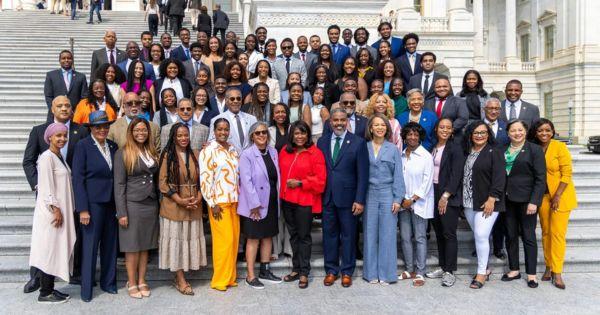The Record-Setting Number of Black Members in Congress
The 119th session of Congress is set to witness a historic shift with the Congressional Black Caucus (CBC) comprising 62 Democratic members. This unprecedented representation contributes to the highest number of Black federal lawmakers in history, underscoring the evolving landscape of American politics. In total, 67 Black individuals will serve in Congress, with five Republican members not part of the CBC. This shift comes at a critical time, as Rep. Gregory Meeks of New York emphasized the CBC’s intention to challenge the incoming administration of President-elect Donald Trump and its allies on policies impacting Black Americans.
The Disparity Still Lingers
As of the 118th Congress, there were 58 Black members in the U.S. Congress, which includes both the House of Representatives and the Senate. This is out of a total of 535 members. The majority of these are in the House of Representatives, with only two Black senators—Sen. Cory Booker (D-NJ) and Sen. Tim Scott (R-SC).
In contrast, White members make up the majority of Congress. In the House of Representatives, approximately 74% of members are White. In the Senate, the percentage is even higher, with about 92% of senators being White. The exact numbers can change slightly with each election cycle, but the disparity remains significant, showcasing the underrepresentation of Black Americans in the legislative branch compared to their proportion in the general U.S. population.
A Legacy of Advocacy: The History of the Congressional Black Caucus
The CBC, established in 1971, has a rich history rooted in advocacy for Black Americans and marginalized communities. While the caucus has always represented Democratic values, its mission transcends party lines. The CBC’s primary goals have included promoting voter enfranchisement, ensuring access to healthcare, expanding educational opportunities, pushing for job reforms, and advocating for criminal justice reform. The caucus has also prioritized fostering foreign relations with nations with significant Black populations. With its current membership representing over 120 million Americans and 41% of Black Americans, the CBC remains a critical voice in shaping policies that reflect the needs of the Black community.
Holding the Trump Administration Accountable
Rep. Meeks, who serves as the ranking member of the House Foreign Affairs Committee, has made it clear that the CBC’s mission in the upcoming Congress is to serve as a vocal counterbalance to the Trump administration’s policies. “We’ve always been the conscience of the Congress, and that’s no matter who’s in charge,” Meeks stated. This commitment to holding power accountable will be amplified by the expanded CBC, which Meeks describes as a “whole choir” rather than just a “quartet,” signaling an increased capacity to challenge and influence legislative outcomes.
Meeks’ strong stance includes opposition to potential threats to the Affordable Care Act, which the CBC plans to resist vigorously. The caucus’s priorities will include fighting for health care access and prescription drug affordability, areas that directly impact many Black communities. Meeks and the CBC aim to highlight policy decisions and Cabinet appointments that could disproportionately affect marginalized populations, criticizing selections such as Dr. Mehmet Oz for overseeing Medicaid and Medicare and Linda McMahon as the nominee for Secretary of Education.
A Historic Moment Amid Republican Control
The CBC’s growth from 60 members in the 118th Congress to 62 members in the 119th session is a significant development, especially given the Republican control of both the House and Senate. Despite these limitations, Niccara Campbell Wallace, executive director of the Rolling Sea Action Fund, highlighted the potential influence of this unprecedented number of Black Congress members. “You feel good about what these historic number of Black Congress members can do in terms of helping influence what comes down the pipe,” Wallace noted, pointing out the CBC’s role as a voice that can push back against harmful policies and advocate for progressive changes.
The Enduring Fight for Representation and Change
The CBC’s mission to advocate for Black Americans resonates deeply with the historical struggle for political representation and rights. In the early 19th century, Black individuals faced systemic exclusion from legislative processes. The first Black member of Congress, Hiram Revels, served in the Senate in 1870 during the Reconstruction era. Since then, the number of Black lawmakers has increased gradually but significantly, with the CBC’s formation in 1971 serving as a pivotal moment for organized political action.
Rep. Meeks’s commentary reflects the ongoing fight to ensure that policies do not negatively impact Black and marginalized communities. “We’ll be making it clear that in just two years, we can reverse and stop some of the things, some of the tragedies, of the administration-elect,” he said. This forward-looking stance underscores the CBC’s determination to be a powerful, influential force in the face of a potentially challenging political landscape.
The Future of Black Political Influence
With an eye on the 2026 midterm elections, Rep. Meeks affirmed that the CBC would continue to campaign and build momentum over the next two years. The group intends to make it clear that their work is vital not just for legislative change but for shaping the direction of American politics for generations to come. The CBC’s activism reflects the enduring belief of Black Americans in a more equitable and just future, despite the historical and ongoing challenges of being underrepresented in political decision-making.
The CBC’s growth and assertive stance during the Trump administration will be an essential part of its legacy, highlighting the power and resilience of Black political leadership in advocating for systemic change and accountability.








